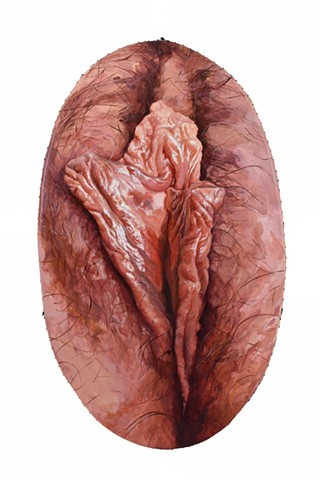Paradise Lost
Language has a major impact on our psyche. Until recently, “vagina” has been considered a dirty word that made people feel uncomfortable. Its use is still heavily regulated on social media platforms and in mainstream media. Because of the stigmatization many of us, even in sex ed class, have never learned the distinction between vagina (the internal muscular canal that extends to the neck of the uterus) and the word Vulva (the outer part of female genitalia, including the labia majora, labia minora and clitoris.)
A host of artists, writers and activists have been working to change the stigma towards the vulva and vagina. Perhaps the most infectious change of attitude towards this language has been Eve Ensler’s 1996 play, The Vagina Monologues. Yet, “Despite this increased enthusiasm to embrace the vagina, ignorance and taboos persist.
In a recent survey (YouGov, 2019), women in the UK were asked to label the different parts of female genitalia. The results are shocking: one-third (29%) could not locate the clitoris, over half (55%) incorrectly labeled the urethra, 43% did not know where the labia were and 45% could not identify the vagina.” *
What you don’t know can hurt you. 2019 United Kingdom surveys (Eve Appeal and YouGov) reported that only 19% of parents use the word vagina when talking to their daughters about this part of their anatomy, 1% used vulva and more than 1 in 5 parents avoided using any word at all. More than 1/3 felt it was inappropriate to use the words vulva and vagina below the age of 11. *
“Vagina and vulva are not wrong words, rude words, or too anatomical words, they are simply the correct words, and it is only an adult’s own hang-ups that colours them otherwise.” *
If we don’t have the language to speak about our bodies, how can we effectively communicate about them? How can children talk to adults when their bodies are hurt or violated? How can teenagers and young adults advocate for their sexual health, communicate to their partners about what hurts and ask for what feels good? How can adults seek proper medical help (beyond WebMd) when things don’t feel or look quite right? To be able protect and understand our bodies, we need to have accurate accessible language for our anatomy and to feel comfortable using it.
*quotes and paraphrasing come from Catherine Blackledge’s book Raising the Skirt: The Unsung Power of the Vagina
Visit her personal site Catherineblackledge.com for more info on her empowering work.
